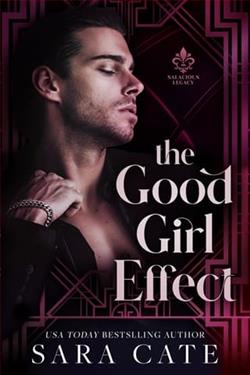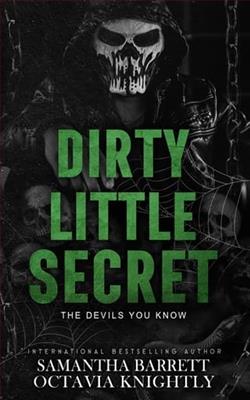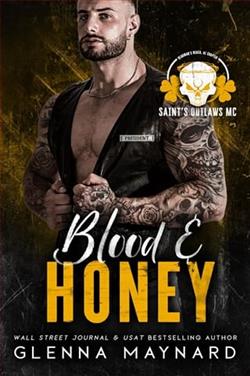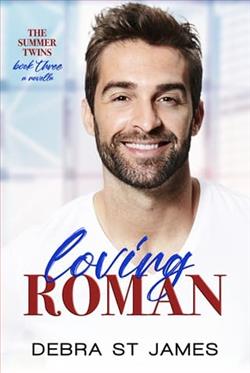Page 78 of His
Positano, Italy
“Tell me about today.” The therapist, Allegra, smoothes her alabaster pencil skirt as she settles into her leather chair.
Astor looks at me and smiles. “It was a good day.” He squeezes my hand. “We started with a long walk on the beach, as you’ve recommended.”
“Great. Exercise first thing in the morning is optimal for people who struggle with anxiety. Good job.”
Though we’ve been in Italy for months now, I still struggle with Allegra’s thick Italian accent.
“And how are you sleeping, Astor?”
When he hesitates, I step in. “We have good nights and bad nights, but more good than bad lately. We found a cooking show that we both enjoy. We record it and watch it to wind down. No news, phones, electronics, just food.”
Allegra laughs. “I remember you two said you had begun taking cooking classes together, yes?”
“It’s more of Sabine showing me how to cook.”
“Good, that’s good. Wonderful bonding time. I must say, you two have come so far since our first visit.”
Believe it or not, it was Astor’s idea to begin therapy together. After Valerie died and we realized she was the one who killed her own daughter for Astor’s money, Astor and I both agreed that we needed to get far away for a while, and needed to get help to process. To reset, unplug, recalibrate. Together we chose Italy, where Astor owns a villa (because of course he does), and one of the first items on our to-do list was to find a therapist to help work through the trauma together.
“And how is Brittney doing?”
I sit up, smile. “Wonderfully. She just flew in today and is coming for dinner tonight.”
“Oh! That’s wonderful,” Allegra exclaims.
If you would have asked me six months ago what I would be doing today, I would not have said vacationing in Italy with Astor, and inviting Valerie’s twenty-one-year-old nurse to visit, I would have laughed.
In the days following Valerie’s death, we realized just how much she had been playing and manipulating us—even Brittney.
In the final week of Valerie’s life, Valerie confessed everything to Brittney in small blocks of disjointed confessions, while sprinkling in delusional comments to throw Brittney off.
Brittney, assuming it was a combination of her new medication and illness, didn’t feel the need to say anything because she assumed it was “normal.”
To Brittney, Valerie confessed to killing Chloe after realizing she’d been left out of Astor’s will. To Valerie, one million dollars was more valuable than her child. So she began planning. Valerie knew that by cutting a lock of Chloe’s hair, Astor would assume it was a message from one of his enemies—exactly as he did—and would never consider her.
Valerie kept this a secret, even from her sister Prishna, who loved Chloe and raised her from infancy. I now understand why before Valerie died, she asked, don’t you understand? She was asking Prishna if she understood why she had to do it. Perhaps guilt—or fear of what lay ahead—was getting to her in her final moments.
Brittney also felt tremendous guilt for not telling us about the confessions. Since Valerie died, Brittney and I have grown incredibly close, building a bond that feels a lot like one a mother and daughter would have. She, like us, is still processing everything that happened. We speak and text daily, and I look forward to every one of them.
It’s amazing how trauma spreads to those around us, but even more amazing how love can heal it.
Allegra studies us for a moment with a smile. “For this session, I’d like us to begin a new phase in our therapy. Are you open to that?”
“Yes,” we say in unison.
“I want you both to keep a journal—separate journals. Inside it, I want you to jot down moments that you feel your best. The happiest, or the most like yourself. It’s important not to overthink it. Make it simple so that it doesn’t feel like a chore. For example, today I felt most myself while jogging by the lake. Or, today, I felt happiest while sharing coffee with Astor. Or, taking a walk, seeing the sun set, smelling the rain, drinking a glass of wine.” She winks. “Anything like that. Write it down.”
“And what are we accomplishing with this,” Astor asks, always having to know the whys behind everything. It helps him process, I’ve learned.
“When we go through traumatic experiences, sometimes our observation skills can be altered. Meaning, we get locked into a feeling of doom, or flight or fight, and before too long, everything we look at is through that altered lens. This exercise helps rewire our brain to notice the little things that make us happy throughout the day, and I think you’ll be surprised how many little things there are. Over time, your perspective shifts. That’s the goal.”
“I like that,” I say. “Like a gratitude journal.”
“Kind of, yes, but again, don’t overthink it. Let’s start now,” Ana says. “What is something that happened today that made you smile?”
Astor and I look at each other.















